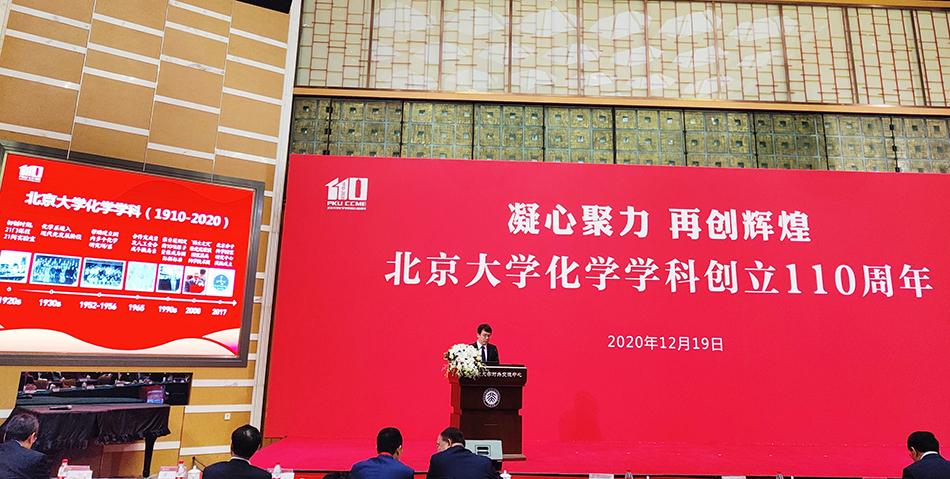The Paper's reporter Cheng Ting
On December 19, The Paper learned from the 110th anniversary of the founding of the Chemistry Department of Peking University that in the past 110 years, the Chemistry Department of Peking University has trained nearly 20,000 chemistry professionals for the country. Among them, there are about 14,000 undergraduate graduates and about 6,000 graduate students, including more than 2,800 doctoral students.

The scene of the 110th anniversary of the founding of the Department of Chemistry of Peking University. Photo by The Paper's reporter Cheng Ting
Tang Aoqing, Cao Benxi, Shen Panwen, He Binglin, Chen Ruyu, Zhang Huan, Zou Chenglu, Niu Jingyi and other students who came out of here successively became academicians of the Chinese Academy of Sciences.
According to a survey of graduates in the school of chemistry and molecular engineering of Peking University in the past decade, there are a total of 1462 undergraduate graduates in the college from 2011 to 2020, of which 79% choose to go abroad or study abroad; 12% choose direct employment, mainly concentrated in the fields of grass-roots selection and transfer, educational institutions, etc.; and some graduates choose flexible employment. In the same period, among the graduate graduates of the college, master's students accounted for a relatively small proportion, and the graduation direction was mainly to further education; the graduation direction of doctoral students was mainly to continue further study, academic research institutions and professional related enterprises, and some graduates chose to work in grass-roots government units and state-owned enterprises and institutions in the western region.
The Department of Chemistry of Peking University began in 1910 as the Tang ge Zhike Department of Chemistry of Beijing Normal University, and was established in 1919 as the Department of Chemistry of Peking University, and in 1994 it was renamed the School of Chemistry and Molecular Engineering of Peking University (referred to as the School of Chemistry of Peking University).
In the course of 110 years of development, Peking University Chemistry has made remarkable achievements.
Since 1959, Academician Xing Qiyi led the teachers and students of the Department of Chemistry of Peking University to cooperate with the Shanghai Institute of Biochemistry and the Institute of Organic Chemistry of the Chinese Academy of Sciences to carry out the research of a major scientific research project of artificial fully synthetic bovine insulin, which was completed in September 1965. In July 1982, this major basic research achievement with the world's advanced level won the first prize of the National Natural Science Award.
Since the 1970s, Academician Xu Guangxian has made important contributions to rare earth separation theory and its application, rare earth theory and coordination chemistry, and nuclear fuel chemistry. The cascade extraction theory he established has completely changed the experimental amplification mode of rare earth separation process from development to application, realized the "one-step amplification" of design parameters to industrial production, and enabled China to achieve a leap from a rare earth "resource country" to a "big producer", which is called "China's impact" by the international rare earth community.
At the commemorative meeting, President Hao Ping reviewed the achievements of Peking University Chemistry along the way, and put forward three hopes for the future development of Peking University School of Chemistry on behalf of the school. He expressed the hope that the School of Chemistry of Peking University will serve the national strategy, seize the forefront of science and technology, adhere to the equal emphasis on technical disciplines and applied disciplines, promote the in-depth integration of production, education and research, and create more breakthrough achievements; adhere to the principle of cultivating people with virtue, and cultivate more top-notch innovative talents with ideals, convictions, solid professional foundations and love of scientific research for national rejuvenation and national development; optimize the discipline system, strengthen collaborative innovation, and enhance the vitality of connotative development.
Editor-in-Charge: Jiang Chenrui